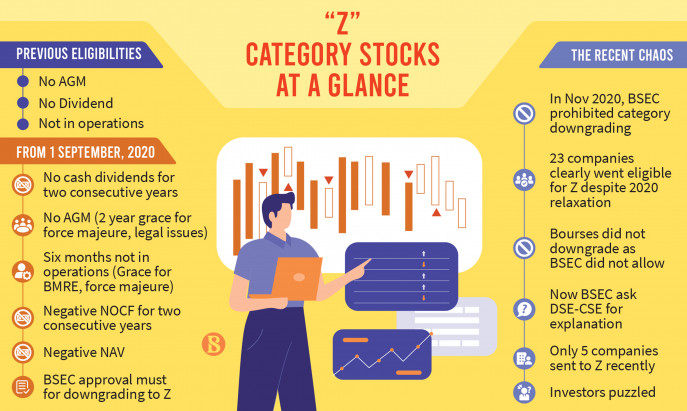The 'Z' chaos in the stock market
BSEC in November 2020 prohibited stocks category downgrading and the order to the bourses was never repealed. Now it asks DSE to explain why some sick companies were not placed in the “Z” category

Bourses and stock investors, over the last two weeks, have seemed too puzzled to conclude when a listed company should be punished as a so-called "Z" category stock and when it should not be.
They were finding too many deviations between the regulations and the ongoing practices.
At least 23 of the listed firms were clearly deserving of being downgraded to "Z" much earlier last fiscal year, according to the 1 September 2020 notification by the Bangladesh Securities and Exchange Commission (BSEC) that relaxed the criteria for the companies to be placed in the "Z" category.
Surprisingly, each was still trading as superior "A" or "B" category-company shares until the puzzled bourses, responding to some criticism, downgraded five of them on 25 June, creating another sudden shock for the investors as downgrading to "Z" means inconveniences in secondary market trading and a price fall.
On the following day, the BSEC asked the Dhaka Stock Exchange to explain why each of the 23 companies was not regularly reviewed and placed in the "Z" category.
"We have already replied to the regulator's letter," said M Shaifur Rahman Mazumdar, acting managing director at DSE.
Following the 2020 regulations change, there had been some confusion regarding downgrading listed companies to "Z" and the DSE had been seeking BSEC approval for downgrading companies to "Z" in eligible cases, he said, declining requests for further details.
TBS, however, saw an unpublished BSEC letter written to both the bourses of Dhaka and Chattogram in November 2020 that prohibited category downgrading, and the order was never repealed later.
This was the key to all the false appearances of sick companies' categories on the bourses, said officials at the stock exchanges, seeking anonymity.
"The BSEC order barred us from downgrading companies, and now we have to show cause," said one of them.
The relaxations of 2020 were for the greater interest of the capital market, listed firms, and their investors amid an unusual situation during the pandemic, and they were mainly exempting firms' accidental tough times in paying dividends, not every single non-compliance, said BSEC Executive Director and Spokesperson Rezaul Karim.
"Seeking explanation is part of the regulator's daily job, and if the explanations are satisfactory, there should emerge solutions to exceptional problems," he added.
BSEC also asked both the DSE and the Chittagong Stock Exchange (DSE) on Wednesday to explain why they did not monitor, act on, and report on the Z-category companies.
Since the November letter, no company went to the Z category until 25 June, said DSE-CSE officials.
"What should we report when no company entered into Z?" said one of them.
Listed companies that fail to stay in operations, hold an annual general meeting, or pay dividends within stipulated time used to be categorised as "Z" by the bourses, eying a comparative inconvenience in trading of their shares through allowing no leveraged trading and a longer settlement cycle and, of course, a weaker image among investors.
BSEC, in a September 2021 notification prior to the November, 2020 letter to the bourses, said no cash dividend, negative operating cash flow for two straight years, negative net asset value, no AGM in six months of the fiscal year ending despite no legal complexity, no operations for more than six months despite no factory modernization project could result in downgrading to "Z" with the regulator's prior approval.


 Keep updated, follow The Business Standard's Google news channel
Keep updated, follow The Business Standard's Google news channel
















